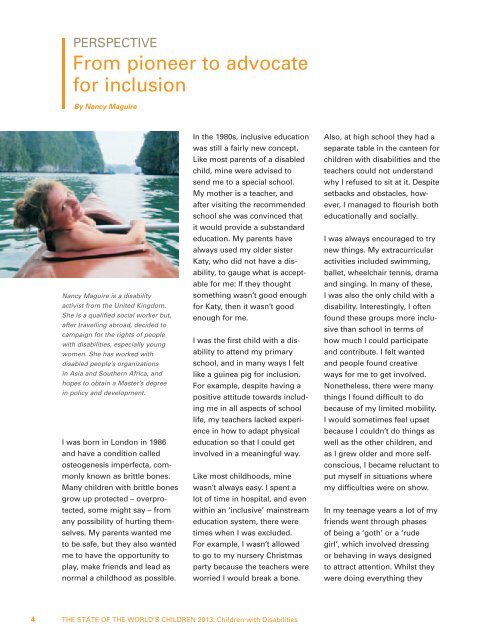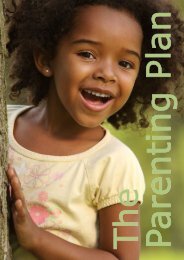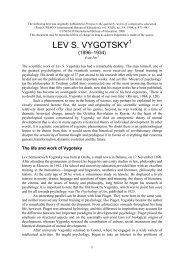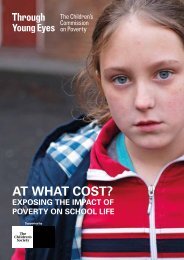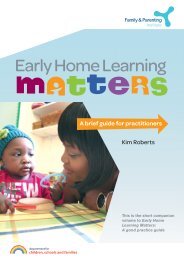Children with Disabilities
Children with Disabilities
Children with Disabilities
Create successful ePaper yourself
Turn your PDF publications into a flip-book with our unique Google optimized e-Paper software.
4<br />
PERSPECTIVE<br />
From pioneer to advocate<br />
for inclusion<br />
By Nancy Maguire<br />
Nancy Maguire is a disability<br />
activist from the United Kingdom.<br />
She is a qualified social worker but,<br />
after travelling abroad, decided to<br />
campaign for the rights of people<br />
<strong>with</strong> disabilities, especially young<br />
women. She has worked <strong>with</strong><br />
disabled people’s organizations<br />
in Asia and Southern Africa, and<br />
hopes to obtain a Master’s degree<br />
in policy and development.<br />
I was born in London in 1986<br />
and have a condition called<br />
osteogenesis imperfecta, commonly<br />
known as brittle bones.<br />
Many children <strong>with</strong> brittle bones<br />
grow up protected – overprotected,<br />
some might say – from<br />
any possibility of hurting themselves.<br />
My parents wanted me<br />
to be safe, but they also wanted<br />
me to have the opportunity to<br />
play, make friends and lead as<br />
normal a childhood as possible.<br />
In the 1980s, inclusive education<br />
was still a fairly new concept.<br />
Like most parents of a disabled<br />
child, mine were advised to<br />
send me to a special school.<br />
My mother is a teacher, and<br />
after visiting the recommended<br />
school she was convinced that<br />
it would provide a substandard<br />
education. My parents have<br />
always used my older sister<br />
Katy, who did not have a disability,<br />
to gauge what is acceptable<br />
for me: If they thought<br />
something wasn’t good enough<br />
for Katy, then it wasn’t good<br />
enough for me.<br />
I was the first child <strong>with</strong> a disability<br />
to attend my primary<br />
school, and in many ways I felt<br />
like a guinea pig for inclusion.<br />
For example, despite having a<br />
positive attitude towards including<br />
me in all aspects of school<br />
life, my teachers lacked experience<br />
in how to adapt physical<br />
education so that I could get<br />
involved in a meaningful way.<br />
Like most childhoods, mine<br />
wasn’t always easy. I spent a<br />
lot of time in hospital, and even<br />
<strong>with</strong>in an ‘inclusive’ mainstream<br />
education system, there were<br />
times when I was excluded.<br />
For example, I wasn’t allowed<br />
to go to my nursery Christmas<br />
party because the teachers were<br />
worried I would break a bone.<br />
THE STATE OF THE WORLD’S CHILDREN 2013: <strong>Children</strong> <strong>with</strong> <strong>Disabilities</strong><br />
Also, at high school they had a<br />
separate table in the canteen for<br />
children <strong>with</strong> disabilities and the<br />
teachers could not understand<br />
why I refused to sit at it. Despite<br />
setbacks and obstacles, however,<br />
I managed to flourish both<br />
educationally and socially.<br />
I was always encouraged to try<br />
new things. My extracurricular<br />
activities included swimming,<br />
ballet, wheelchair tennis, drama<br />
and singing. In many of these,<br />
I was also the only child <strong>with</strong> a<br />
disability. Interestingly, I often<br />
found these groups more inclusive<br />
than school in terms of<br />
how much I could participate<br />
and contribute. I felt wanted<br />
and people found creative<br />
ways for me to get involved.<br />
Nonetheless, there were many<br />
things I found difficult to do<br />
because of my limited mobility.<br />
I would sometimes feel upset<br />
because I couldn’t do things as<br />
well as the other children, and<br />
as I grew older and more selfconscious,<br />
I became reluctant to<br />
put myself in situations where<br />
my difficulties were on show.<br />
In my teenage years a lot of my<br />
friends went through phases<br />
of being a ‘goth’ or a ‘rude<br />
girl’, which involved dressing<br />
or behaving in ways designed<br />
to attract attention. Whilst they<br />
were doing everything they


